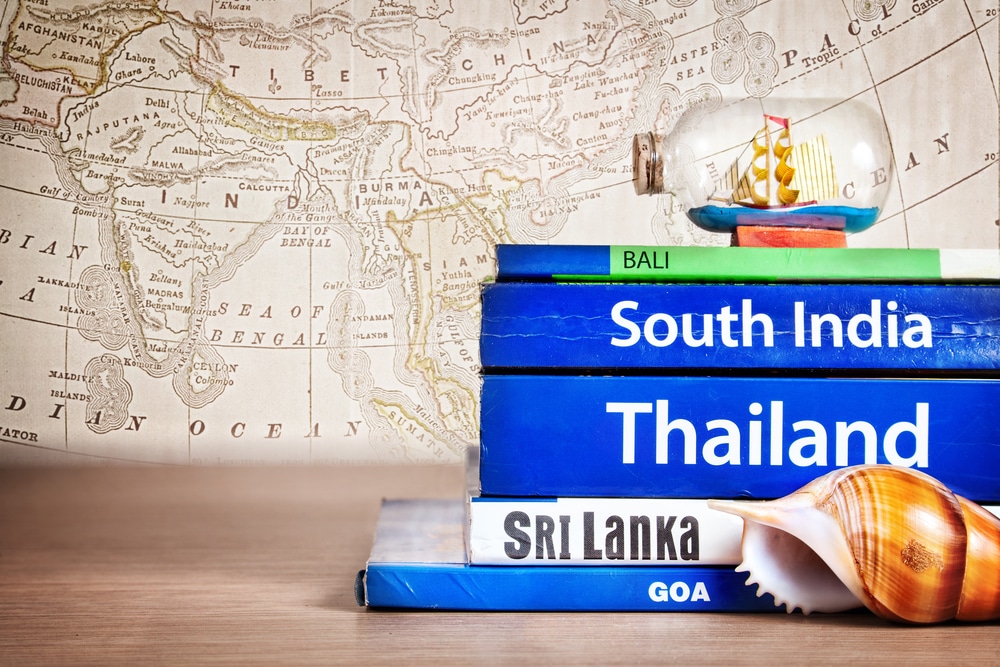Jasmine Birtles
Your money-making expert. Financial journalist, TV and radio personality.


You don’t have to cut out your Easter holidays to save money this year. Just book smarter. There are loads of ways to save money on your holiday, whether it’s being internet savvy or just practical. We’ve put together a guide to help you sift through the mounds of deals and get the best prices available.
The internet is the place to get the good deals. Whether you’re putting together a holiday by yourself or you’re getting a package, online deals outstrip those available on the high street or with telephone booking services. This is simply because these services involve having a sales team which the company has to pay, so their salaries are added to your holiday prices. However, just because the internet is the place to get the best deals, it doesn’t mean that it’s easy to find them.
Don’t just go for the search engines you know from the television or ones that come up first when you Google ‘holidays’. They don’t necessarily have the good deals. We’ve got some suggestions of sites that are good to use for specific things and we think you should look at all of them to get the best price.
For short haul flights you should check out these lesser known sites:
Both Skyscanner and Momondo give you live prices. It is a bit of a slog to look at all the sites, but it’s the best way to get the best deal.
For long haul the more common search engines like Opodo and Expedia will be able to come up with good fares. However, don’t forget to take a look at Cheapflights, Kayak and Travelocity. Also, check out our travel comparison service.
If your destination is a big airline hub like Chicago, Bangkok or Newark, the best prices will almost certainly be found on the bigger consolidator sites like Travel Bag, Trailfinders and Expedia as they buy their seats in bulk and thus drive down the individual seat price.

If you don’t know where you want to go or what kind of hotel you want then check out the usual sites like Lastminute.com, Expedia and ebookers.
However for specific destinations try looking at Traveljungle and Hotels comparison. They have a more detailed search system and a better selection of hotels and will show you roughly the sort of prices to expect. Using this info you can make a booking appropriate to what you can afford. Also, these sites help you avoid endless searching for prices that don’t exist, or paying more than you need to. If you know exactly what you want to pay but you are flexible on where you go, Priceline let you name your price and destination and they will find accommodation that fits your budget and requirements.
If you find a hotel using a search engine, always check directly with the hotel to see if they can offer you a better price. Often the lowest prices will only be available direct from the hotel. You could suggest they take off some of the commission they would have paid the website and together you split the difference.
If you’ve got your heart set on a specific hotel but it’s fully booked, Laterooms can often squeeze you in.

For car rental it’s again a question of shopping around for the best deal. Different car rental franchises often offer surprisingly different prices at various times so you can’t trust any one car rental company to always be cheaper than another. So do a comparison. Look on Carrentals.co.uk and Holiday Autos which are both web brokers designed to get the best deals regardless of company to find the best deals for the kind of car you are looking for, when you need it.

On the whole, booking well in advance will save you money. Planes, trains and buses all have a certain quota of seats that they will sell for the lowest price. Once these seats are booked up, the next lot of seats will be a bit more expensive and so on. This means that if you book early, you’ll have a good chance of bagging one of the cheapest seats. This goes for hotels, theatres and ferries too.
However, you can, of course, get very good deals last minute, particularly if you are not too fussy where you go. With the emergence of sites like Lastminute.com, more and more people are putting off booking until very late. But, even though you can get good deals late in the game, ultimately the very cheapest deals are available in advance.
If you are booking a car, flight and hotel together, a travel agent will probably be able to get you the best all-round deal, even better than if you spent ages searching for prices on the internet. They can also sort out all your activities and excursions for discounted prices whilst you are away. To get a discount, try bartering with a travel agent. You can ask them to match a price you have been offered elsewhere and, now more than ever, you should be able to negotiate a really good deal.

Fares early in the morning and late at night are generally cheaper than those that are conveniently during normal waking hours. Brave dragging yourself out of bed at two in the morning to catch a 4 am flight, and you can probably get cheaper fares. This is especially true on ferries that run throughout the night.
This is probably one of the best money-saving tips, because as well as economising big-style you will also get a much more authentic experience of the place that you are visiting. Most house-swaps are organised through agencies who either have internet sites or member catalogues (see below).
When you join you will have to provide all the information about where you would like to go, dates when you could possibly go (being flexible will facilitate finding a swap), how many bedrooms and bathrooms you have in your house, as well as appliances and any extras you have like a big garden, garage or swimming pool. You can also opt to exchange the use of your car with the use of the other family’s vehicle to save you having to rent one.
The most worrying aspect of house-swapping is the trust factor. Lots of people do not feel comfortable lending their house to someone else. However, the best way to assure a good swap is to find a reputable organisation to organise the swap. We have a list of some, below, but it’s also a good idea to get recommendations from friends.
Most of the agencies charge a one-off annual membership fee of less than £100 and will refund this if you do not manage to organise a swap during that year. Paying the money often means that you deal with people who are genuine about house-swapping and will respect your property as they will want you to respect theirs. There are free services as well, though, just make sure you check out the organisation thoroughly before committing to anything.
For more information read our full article on house-swap holidays.

Get cheap accommodation by joining up with friends or another family and renting a holiday cottage or villa all together. There are thousands of organisations with properties all over the UK and Europe and usually the price for a cottage that sleeps eight is not double the price for a cottage that sleeps four. It also means lots of fun to be had and a nicer property might be attainable if you pool your funds. Have a look at these sites to get started:
You can also save money by booking directly with the house owner instead of going through an agent. Take a look at HomeAway and see if you can get a better deal.

In exchange for your details and the chance to send advertising emails to you every now and then, lots of companies will send you promotional offers and let you know first about any sales events. Take advantage of this without clogging up your normal inbox by signing up for a free account to use for newsletters. Travelocity has a newsletter that you can sign up for, as do Travelbag, Trailfinders, Expedia and lots of others. It’s also worth signing up for the newsletters for hotel chains as you could get special deals on hotel rooms. Accor Hotels has one as does Holiday Inn.

The Gatwick and Heathrow expresses may be the speediest way to get to the airport, but they are also by far the most expensive. They are both funded by private investors who want to make lots of money back and so their fares are extortionate. Not to worry; there are plenty of ways to get to the airport for less:
The rule of thumb when going to any airport across the UK is that the obvious option isn’t always the cheapest, so plan in advance and shop around to get the best fares. If you’re using a taxi to get to and from the airport, book in advance, shop around and agree a price that you want rather than paying more at the airport where taxis are much more expensive.
When driving to the airport, you can pay up to four times more than you need to if you park in the airport car park without pre-arrangement. Booking in advance makes things easier and saves you lots. Have a look at the Airport Parking Shop, BCP, Go Simply or do a Google search for other airport parking services and shop around to get the best deal.
MoneyMagpie Tip! Don’t forget to check out BAA’s official site for car parking at Heathrow or Edinburgh airports for the best deals directly from the airport.

Its pretty obvious, but taking into account the strength of the pound against the currency of a country and the cost of living is sensible when planning a holiday. As the Euro is strong against the pound at the moment, you will get fewer Euros for your money in Eurozone countries. In light of this, look at places a little further East like Turkey or Czech Republic which are great tourist destinations and don’t have the Euro.

Don’t just buy the travel insurance pushed on you when you buy your holiday. Travel agents make big profits on these policies and they can be up to five times more expensive than their market value. Instead you should just shop around on the internet.
There are two types of travel insurance: Single trip and Annual (or multi-trip). Single trip only covers you for a week and annual covers you for as many trips as you take in a year. Annual cover is usually around two and a half times the price of single trip so if you go away three times a year it’s better to get annual insurance than to take out new cover for each trip. As always with insurance, there isn’t one best deal; your premium depends on whether you want your family covered, what extent of cover you require, where you’re going and how much excess you’re willing to pay. To check out the best deals for you try our own comparison page. Also, see our article here about how to pick the best travel insurance for you.

If you’ve got time to spare, the bus is an increasingly thrifty alternative to the train or plane. The appearance of the Megabus has forced other bus companies, especially National Express, to offer competitive fares so you can now travel to lots of UK destinations in a really nice coach for just £1 single. National Express also have a 2plus2 annual family pass for £16 a year. It allows two full paying adults to take two children for free. If it’s just you and your child they also do a 1plus1 deal on the same basis for £8. National Express also own Eurolines which operate all over Europe and have fares to Ireland, Paris, Amsterdam and other destinations from just £15 single.

We all complain about how expensive train fares are, but you can get some bargains if you are well prepared. The golden rule is book early, early, early. The best fares are always advance single tickets that offer no flexibility, so if you miss your train, you can’t just hop on another. However, if you can be punctual and don’t mind being tied down to a specific train then you can save sometimes as much as 80% on the price of your ticket. These advance tickets are usually not available during peak times and not all train companies offer them. They are not available to all destinations, but it’s worth a look to see if you can get a good deal to an intermediary station and then pay less for a saver return between there and your final destination. Check out The Trainline, Railsaver or National Rail, to compare deals.
When travelling in Europe and abroad the train is an even more viable option as the mainland European lines are faster and less impeded by delays than in the UK. The Eurostar is not always cheaper than the plane, but once you factor in the spend on airport transfers it can work out around the same. Again it’s a case of booking a long time in advance, booking online and avoiding travelling at the weekends. Once you’re in France you can get ridiculously cheap fares on France’s rail website IDTGV on which you buy and print your own tickets. You can travel down to the south of France for as little as 19 € and they’ve got lots of other great fares. For booking in France and southern Europe the website that is recommended is Raileurope, but once you get further north in Europe Deutsche Bahn UK is great (actually this is great even for checking train times in the UK!).
When you’re changing money, commission free does not mean profit free. There will be deals that are better than others both on the high street and online. Again it’s all about shopping around and seeing who is offering the best deal at the time. The best rates can generally be found at Travelex and The Post Office. However, do try a few to see which offer the best price and the best service for you.
If you prefer to pay for most things on your card when you’re away, make sure you check that you aren’t being charged extra for foreign transactions. All credit cards will charge you both for withdrawing money and using your card. With debit cards it depends on your bank and the type of debit card you have (visa debit, maestro etc). Check with your bank before you go and if they do charge, think about opening an account that will provide you with a card that doesn’t. We’ve got more info in our clever holiday money article.
If you know you’re going on holiday to a certain destination and the exchange rate for the country’s currency is falling against the pound, like the Euro is now, then it’s always worth buying some currency in advance to get more money for your pound. Keep an eye on exchange rates and plan ahead.
A very safe and secure way of taking money on holiday is to use a pre-pay credit card. We are increasingly keen on these as they are a very good way of keeping your bank details safe. The majority of credit card fraud happens abroad. Check out our article on them here.
The cost of using your mobile abroad is high, both for calling and receiving, but it’s still the most convenient way of communicating with those at home. There are two solutions:

An international SIM card will cost you from £25 to buy, but once you’ve got it, the credit simply never expires. Ultimately, these sim cards are worth having just so that you can receive calls for free, but they also can often beat the rates of your domestic provider on making calls to the UK and sending text messages. Check how much your network will charge you and then work out if you can save money by getting an international sim. These are the main providers;

Abandon your mobile and get a prepaid international phone card. Phonecard companies buy ‘bulk minutes’ from line carriers at huge discounts and so they are able to pass on savings to their customers. You’ll get a lot more minutes for your money using a phonecard than you would if you used your mobile. However, the one major drawback is that to use your minutes you have to dial a local or free access number. This means you’ll have to find a public payphone and you often get fewer minutes than advertised when you use the freephone access number because you are essentially paying for the access with the credit you’ve already got. Despite the pit falls, it’s still worth looking to see if these cards would work for you when you are travelling. In cities and developed countries public telephones are not hard to come by and you’ll still get more minutes for your money when using the freephone number, compared to mobile charges.

Loads of tour operators run offers that allow children to travel for free with a paying adult. If you’re booking with a travel agent they’ll probably point you towards these deals straight away, but if you’re booking online you should always look out for them. This applies for hotels and transport too as many will do family deals and sell tickets where child places are free or only a little extra.
You can also often get travel insurance that will cover your children for free, so when shopping for insurance always look out for providers that cover children with no extra cost, and if your provider doesn’t do it, get in contact with them and ask if they will do the same deal.
We know that you can’t always avoid going away in your own school holidays, but half-term holidays in Europe are often staggered and may not fall at the same time as British holidays. Check with the local tourist office for the school holiday dates and try to plan your holiday to fall outside of them. Although you won’t save on flights and transport from the UK, once you’ve arrived you will save money on accommodation, activities and even travel.

Getting your guide book out of the library instead of paying for a new one can save you £10 plus, especially if you are going to several destinations with a different guide for each. You can sort out extended loans on books if you are going to be away longer than the loan period, or just renew online. If you want recommendations from people who have really been there and done it, there are some great review sites that also have online travel guides. Check out:
We at MoneyMagpie especially like the site Worldreviewer. It’s more than just a travel review site; it can help you find the locations where you can take part in the activities you like or see the sites you’re desperate to see. Alternatively if you’ve already got a holiday destination in mind you can search by location and find out exactly what sightseeing and activities there are to do. There are lots of different travel experiences documented by experts and some great photos and videos. To get some help planning your trip for free take a look at Worldreviewer now.

Quidco are a real MoneyMagpie favourite as they allow you to claim cashback on your everyday spending such as utilities and insurance. Now they’ve taken it a step further, with all the top travel brands on board!
Quidco‘s free to join, with over 3,500 retailers to browse. After you click through from Quidco to the travel agent and book your holiday, Quidco receive commission from them and pay it straight into your bank account!
Online voucher and promotional code sites are not the most reliable, but they do sometimes have functional codes that can get you money off your flights, hotel booking or even holiday package. The big names are:

Where is admin?!
Thanks
Where is admin?!
Hope for answer